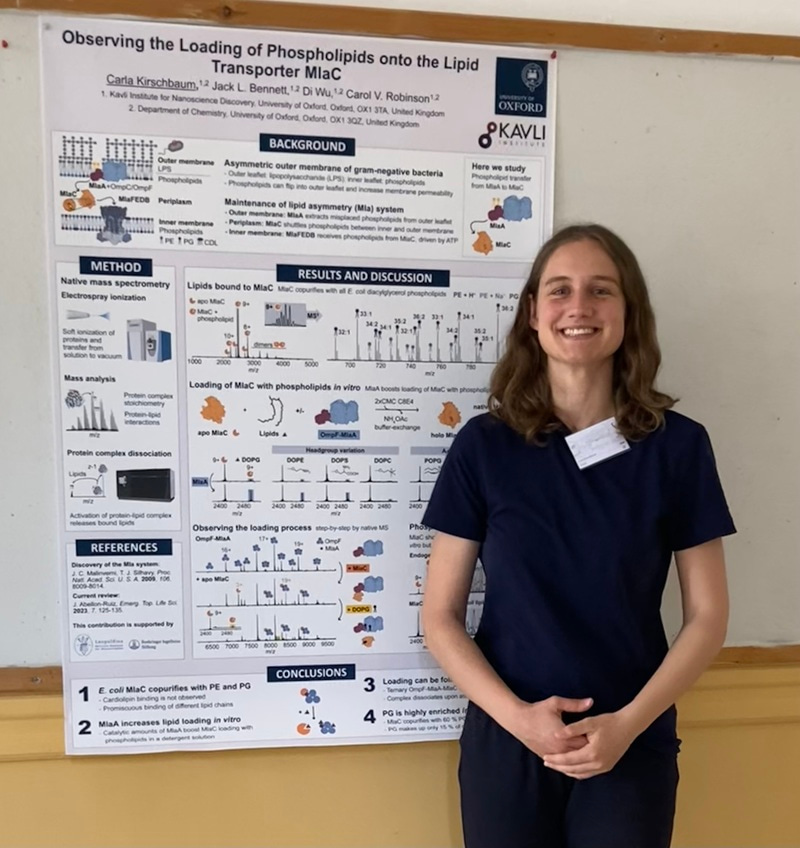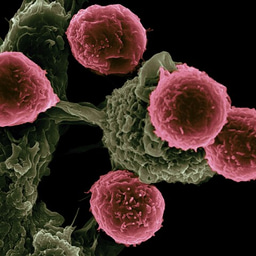Meet Carla Kirschbaum: FEBS Advanced Courses 60th Anniversary Awardee

Our interviewee is Carla Kirschbaum, Postdoctoral Leopoldina Research Fellow at the Kavli Institute for Nanoscience Discovery, University of Oxford, United Kingdom, and a member of the Biochemical Society, a FEBS Constituent Society. Carla received a FEBS 60th Anniversary Award for an Outstanding Presentation at the Joint FEBS/EMBO Lecture Course 'Membranes, Lipids and Proteins in Organelle Biogenesis' (26 May – 1 June 2024) in Spetses, Greece.
Tell us about your research topic/work. What project(s) are you working on? What is the aim of your study?
I study the interactions between proteins and lipids with the aim of understanding how lipids influence the structure and function of proteins. In particular, I work on membrane proteins, which are embedded in the cell membrane and often require lipids as an essential component for their function. In my current project, I am investigating changes in protein-lipid interactions in cancer, which are associated with major changes in lipid metabolism. The main technique that I use to interrogate these non-covalent interactions is native mass spectrometry. The experimental setup allows me to identify protein-bound lipids with great structural detail and even to distinguish between lipid isomers.
Who or what inspired you to choose a career in science?
I chose to study chemistry because chemistry and biology were my favourite subjects at school. During my studies, I became very interested in mass spectrometry and its applications in biochemical research; I have been working with various mass spectrometry-based techniques for lipid analysis since my bachelor's project. My interest in this topic, my enjoyment of research and my great mentors have led me to pursue an academic career up until today.
How did you learn about the FEBS Advanced Course? Why did you choose this course to attend?
The course was recommended to me by a colleague and caught my attention because it covered all my areas of interest: membranes, lipids and proteins. Being relatively new to biochemical research, I saw the FEBS Advanced Course as a great opportunity to get an overview of current research in the field and to connect with people who share my interests.

How does attending this course influence your present and future plans? What are the benefits of attending the FEBS Advanced Course?
The main benefit of the course was that I got to meet people working in a field that I had only recently entered. The lectures and discussions helped me to put my own research into a wider context and opened up topics that I had not been exposed to before. In particular, several presentations sparked my interest in how lipids are transported from their site of synthesis to the various organelles –- a topic that I am now pursuing in a research project. The lectures also gave me a good overview of biochemical techniques that could be useful to me later in my own research.
What work were you presenting at the FEBS Advanced Course?
I presented my work on the maintenance of lipid asymmetry (Mla) system. The proteins composing this lipid transfer system mediate phospholipid transport between the inner and outer membranes of gram-negative bacteria to maintain a protective barrier against antibiotics. Using native mass spectrometry, we observed the loading of phospholipids onto the lipid transporter MlaC, which is mediated by the outer membrane protein MlaA. The study exemplifies how native mass spectrometry enables the investigation of non-covalent protein-protein and protein-lipid complexes and allows the identification of protein-bound lipids with great accuracy.
How does it feel to receive a FEBS 60th Anniversary Award at a FEBS Advanced course as recognition for your work? How do you see this Award influencing your career and future?
I was delighted to receive this award and was overwhelmed by the interest of the other participants in my research. The work I presented at the lecture was the first project of my postdoc in a new research group, so the award gave me reassurance that I am on a good path.
What is your advice to aspiring students/scientists?
That you should not be afraid or reluctant to learn new things and get involved in new areas of research.
Where do you envision the future of your career?
In Berlin. I would like to return there after my postdoc and start my own research group.
For more information about the FEBS Advanced Courses programme visit the FEBS website.
Photo by Pawel Czerwinski on Unsplash.





Join the FEBS Network today
Joining the FEBS Network’s molecular life sciences community enables you to access special content on the site, present your profile, 'follow' contributors, 'comment' on and 'like' content, post your own content, and set up a tailored email digest for updates.